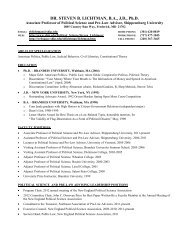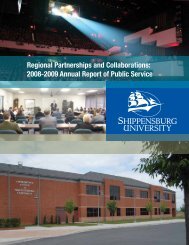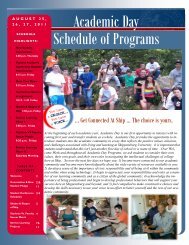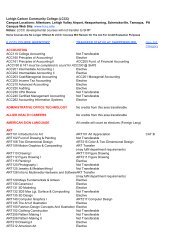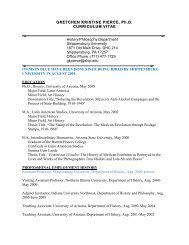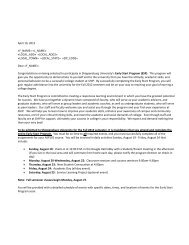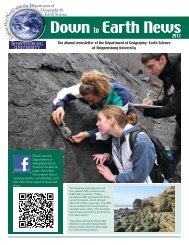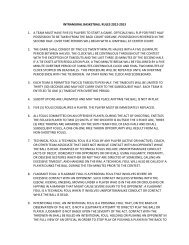29Irrigation Systems and Values:Understanding the Process ofSelf-governing Water Resourcesin Northern ItalyB e a t r i c e Ma r e l l iU niversity o f Mi l a na n d <strong>University</strong> o f Br e s c i aCommon-pool resources (CPRs) are natural orman-made resources shared among different users,a condition that produces a competition for theirutilization leading often (although not necessarily) totheir degradation or even to their destruction (HardinG. 1968) . A vast number of valuable natural resourcesfalls in this category and today shows chronic problemsof overuse. Examples are the world forests, fisheries,water basins, biodiversity, and even the atmosphere.As broad bodies of literature and empirical evidence(Ostrom 1990, 1998, 1999, 2005; Agrawal and Clark2001; Cardenas 2000) have demonstrated, managementof common pool resources implies an institutionalconstruction that would be able to take into accountnot only physical attributes of the resources, but alsoattributes of the communities called to protect them.According to Ostrom (1992, 2005; Ostrom and Ahn2008) among these attributes generally accepted bythe community, there are values of behaviour, vehicleof shared learning and explanations about foundationsof social order (Ostrom V. 1980), crucial variablesof relevance for institutional analysis. After a briefreview of related literature, I am going to analyzehow internal and shared values can affect institutionalevolution in farming irrigation systems. The discussedhypothesis maintains that in small farm communitiesindividual values can interact in the course of timewith the process of water management, leading to aninstitutional evolution that translates these individualdemands for changes in the rules in use applied by thegroups. Such a topic has been addressed analyzing twosmall self-organized farm communities in northernItaly, having as support a qualitative methodologyof investigation based on in-depth interviews. Thisallowed focus on the internal values of the appropriatorsof the resource, key variables for the explanation.As a result, the research found the existence of acommon set of values is extremely useful in increasingthe institutional performance and in controllingopportunistic behaviours. It is also important torecognize genuine trustworthiness appeared as anindependent and non-reducible reason for explaininghow communities achieve collective action compliance.The results also support Ostrom’s (1998, 1999) ideaof a core relationship existing among trust, reputation,and reciprocity. It has been found indeed these variablesare dependent on the community’s past experiences andon the capacity of its members to recognize a majorcommon interest in preserving resources. Once in place,those factors enhance the capacity of a communityto govern its commons and, particularly, to foster theprocess of institutional adaptation that is necessary for along term management of water resources.Theoretical backgroundAccording to Ostrom (1998), elaborating conditionswhere governing and solving social dilemmas (includingcommon pool resources) successfully happen, it ispossible to identify individual attributes at the coreof human behaviours as the following (Ostrom 1998,1999):• the individual expectations regarding otherpeople’s behaviour (trust);• the norms that individuals learn fromsocialization and past experiences (reciprocity);Beatrice Marelli is a member of the political science faculty at the <strong>University</strong> of Milan and the economics faculty in theDepartment of Social Sciences at the <strong>University</strong> of Brescia. She is a guest researcher at Humboldt <strong>University</strong> (Berlin)in the Department of Agricultural Economics and Social Sciences. Her main interests are related to collective actionproblems, institutional arrangements for environmental sustainability, common-pool resources, and human values.
30 PROTEUS: A Journal of Ideas• the identities that individuals intentionallycreate through their own behaviour andinternalisation of norms (reputation).Trust, reciprocity, and reputation are relationshipconstructions that fill a gap of indeterminateness of theobjective social foundation (Cella 1994). According toOstrom (1998) the existence of a mutual reinforcementamong these variables, considered to be at the core ofthe general behavioural explanation, can be dynamicallyillustrated as follows:Source: Ostrom (1998)Reputation, trust, and reciprocity act througha positive retroaction circle. Therefore, it seemsimpossible to individualize them among dependentand independent elements. Every variation on a singlevariable strikes again into the chain on the others,amplifying the initial effect, that could be both positiveand negative.The reinforcement among these individual attributesdepends on structural variables, such as existence ofsmall communities, their past experiences, possibilitiesfor a direct communication, and the existence ofsymmetrical affairs on the resource. All such factorsengrave on the cost of internal and social agreements,from which it derives the cooperation level, initiallyreached through individuals’ ability to set asideselfishness.Jon Elster’s contribution provides support ofthis perspective (1993, 1995). He analyzes altruisticmotivations by identifying different actors’ groupsaccording to different levels of propensity tocooperation. The group that appears to be morerelevant in terms of accomplishing communal argumentis formed by those people who act according to thecategorical imperative of Kant, that answers to thefollowing question: “What happens if all of us wouldact so?” This powerful person’s appeal does not dealwith the real results or private purposes because it isconnected to what could be verified if everyone abstainsfrom the cooperation. Such motivation would forbidthe egoistic behaviour, bringing the community exactlyto an opposite outcome respect to the utilitarianism.For this reason, these results could be extremelyimportant for understanding individual contributions inmatters of commons management.Rationality and valuesSince informal ties are broadly diffused as astructural base for social relationships, the self-interestpoint of view does not occupy a core position in thecurrent relational environment. According to Hirsch(1976), the main question is not concerned withwhether individuals are sociable or altruistic in theirobjectives, but rather is focused on the possibilitiesof realizing the prevailing objectives of sociality andaltruism in the community. For the author, constraintsof the scarcity and demands of social moralityconstitute the two social limits to growth. For thiswork, they can be helpfully interpreted as consequentialbonds derived from the missed solution of the socialaction dilemmas, like the ones we observe in governingcommon pool resources and as a consequence inwater management. Limitation to individual selfishbehaviour, imposed in the collective interest, could bemore effectively respected if the sense of obligationwould come interiorized. Already in the mid 1970s,Hirsch made emerge an interpretative urgency for thegenerality of the goods that will then be developed byOstrom for common pool resources in the mid 1980s:“The public perception of society’s costs in itscomplex will contribute to encourage the socialmorality, but it will not be enough to assure it untilthe individualistic behaviour will preserve its ownlegitimacy in comparison to the broad sphere ofthe collective action. Once more, the individualisticbehaviour can be an obstacle to the satisfaction of theindividual preference”. (Hirsch 1976)Such overcoming, if it points out a predispositionto shared collective beliefs and to be open to acomprehensive vision of cooperative ethic (Sugden1986), does not require the abandonment of rationality.In fact, according to the sociological tradition (Boudon1997, 2000, 2003), actions which are apparentlynot referable to some consequential explanation noranalyzable as effects of instrumental reasons, do nothave to be viewed as completely detached from everyrational logic. In these cases, actors follow principlesfounded upon reasons to which they simply feel obligedto conform to. This is the case of a collective beliefgenesis, whose content becomes an object of voluntaryadhesion by the individuals. Boudon referred to hiswork as an axiological perspective and quoted Weber’svalue rationality (Wertrationalität) as a fundamentalcontribution to contemporary studies focused onmoral feelings. For the present research, what is moreinteresting is distinguishing between the axiologicalrationality and the instrumental one of economic kind.In this manner, one of the limits of the utilitarianmodel emerges with greater clarity: not knowing howto explain attribution of values phenomena. Instead,axiological rationality expressly foresees cases in whichthe subject does not choose to maximize immediatebenefits, but chooses to follow “correct” principles notguided by personal will.



